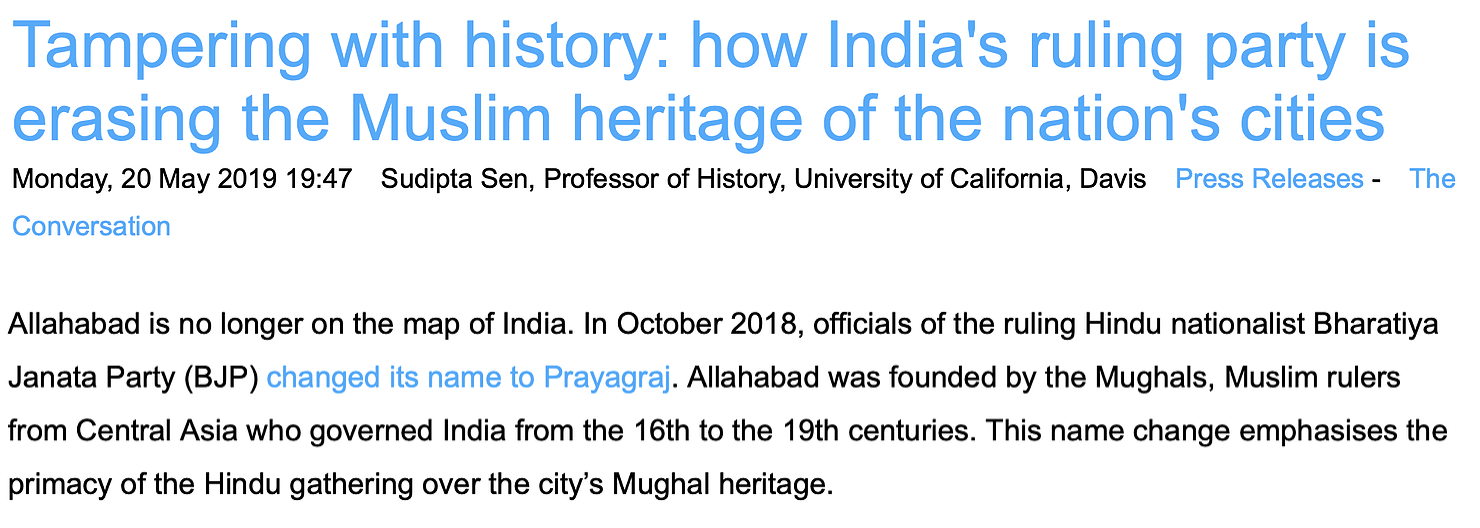Allahabad or Prayag
I understand that because “Allahabad” has “Allah” in it, it touches on religious sensitivities. I assure you, however, that this is not a critique of Islam or an onslaught on Islam. It is a critique of ruthless emperors who changed the name of a venerated area with no regard for the inhabitants of the area. It is also a critique of the emperors themselves, who killed many natives, and enslaved many others. I urge you to keep an open mind as you read through this.
Context
In October 2018, the BJP-led Uttar Pradesh government renamed the city of Allahabad to “Prayagraj”, citing it as a restoration of the original name of the city, Prayag. The UP Government cited that it was the Mughal Emperor Akbar who had changed the name of the city to Allahabad.
There was much outrage, domestically and internationally, as this was seen as an attempt by the BJP to “create a Hindu rasthra (nation)”, a way of “stripping hundreds of years of history” (Outlook India) and a way of “denying such a large population (UP Muslims) its due share in public life and collective memory; to practise exclusionary politics” (IAS Parliament). Many also questioned what the point was apart from petty politics, quoting Shakespeare’s “What’s in a name?” (India Today).
History
Prayag (meaning confluence in Sanskrit) is the name of an ancient Hindu site, located at the point at which the sacred rivers Ganga, Yamuna (and Saraswati) meet (met). Prayag is venerated in many ancient Hindu texts, including the Rig Veda, which historians believe was written in 3000 BCE (Note that the range of estimates varies greatly, from 7500 BCE to 1500BCE). The Kumbh Mela is still held at the site.
Prayag was renamed to “Ilahabas” (or Illahabad by some accounts) (means: Abode of God) by Akbar in 1575 AD. Multiple reasons have been proposed for why Akbar named it as such:
-
Out of his respect for Prayag as a holy site for Hindus
-
After Din-i-Ilahi, the religion Akbar attempted (and failed) to found.
*Note: Many have argued that Illahabas/Illahabad was a new city and was not the same as Prayag. However, Akbar himself noted that he knew it to be Prayag (Or Piyag in some versions)
Ilahabas was then renamed to Allahabad (means: Abode of Allah) by Akbar’s grandson Shah Jahan. Some dispute that it was Jahangir who did this. No clear reasons are given as to why this was done by Shah Jahan, but renaming a city to include “Allah” seems clear in intent.
This does however prove that the BJP’s claim that Akbar was the one who had renamed Prayag to Allahabad was wrong.
Arguments
Allahabad:
Akbar had renamed Prayag to Illahabas/Illahabad as an act of secularism, as an act of respecting a venerated site for Hindus.
Prayag:
If Akbar respected the sacred site so much, he would have let it be. Shah Jahan renamed it to include “Allah” – how is that secular?
Allahabad:
Renaming it promotes a “Hindu rashtra” and is “exclusionary to Muslims”.
Prayag:
Prayag is one of the two oldest cities mentioned in Hindu scriptures. It bears great religious significance and the changing of Prayag’s name to “Ilahabas/Illahabad” could be argued as equally exclusionary to Hindus, if not more.
Allahabad:
There is a loss of identity and history.
Prayag:
The name of the area was “Ilahabad/Allahabad” for less than 500 years. Prayag was the name for over 4500 years. Where was the loss of identity and history then?
Allahabad:
-
What is in a name?
-
Railway signage, systems and paperwork across the country had to be renamed. Government and business stationery had to be destroyed and remade at a cost to the environment.
Allahabad:
The Mughals were ruthless invaders. Although Akbar was more tolerant compared to Shah Jahan and other Mughal emperors, he too had skeletons in his closet that would suggest otherwise (see previous post).
Prayag:
As is being done with Confederate statues and institutions named after Confederates in America, there is great symbolism to renaming a city that was given its name by tyrants. It symbolises rejecting what they represented, and the damage they did.Changing the name does not improve the city in any way.It may not create physical improvements but once again, it is the symbolism that matters the most. The use of names imposed by tyrants continues to glorify them and memorialises their cruel tactics. Rejecting it means rejecting these ideals.
How Some Outlets Responded:
Quartz India

NPR

The Scroll

Okay, so the Scroll said that the Mughals were “the harbingers of their faith” not ruthless invaders even though the Mughals themselves have documented their slaughter.
An excerpt from Business Daily AU:

OpIndia:

Al Jazeera:
 Somehow this isn’t classified as “inciting communal tensions”.
Somehow this isn’t classified as “inciting communal tensions”.
Swarajya:

BBC:

The Guardian:

Bibliography
Articles
Rigveda
https://arrow.tudublin.ie/cgi/viewcontent.cgi?article=1157&context=ijrtp
Illahabas/Illahabad/Allahabad
http://allahabadmc.gov.in/documentslist/City_Development_Plan_Allahabad-2041.pdf
https://www.iasparliament.com/current-affairs/renaming-of-allahabad
https://www.studyiq.com/blog/allahabad-now-prayagraj-latest-burning-issues-free-pdf-download/
https://www.jstor.org/stable/25211537?read-now=1&seq=24#metadata_info_tab_contents